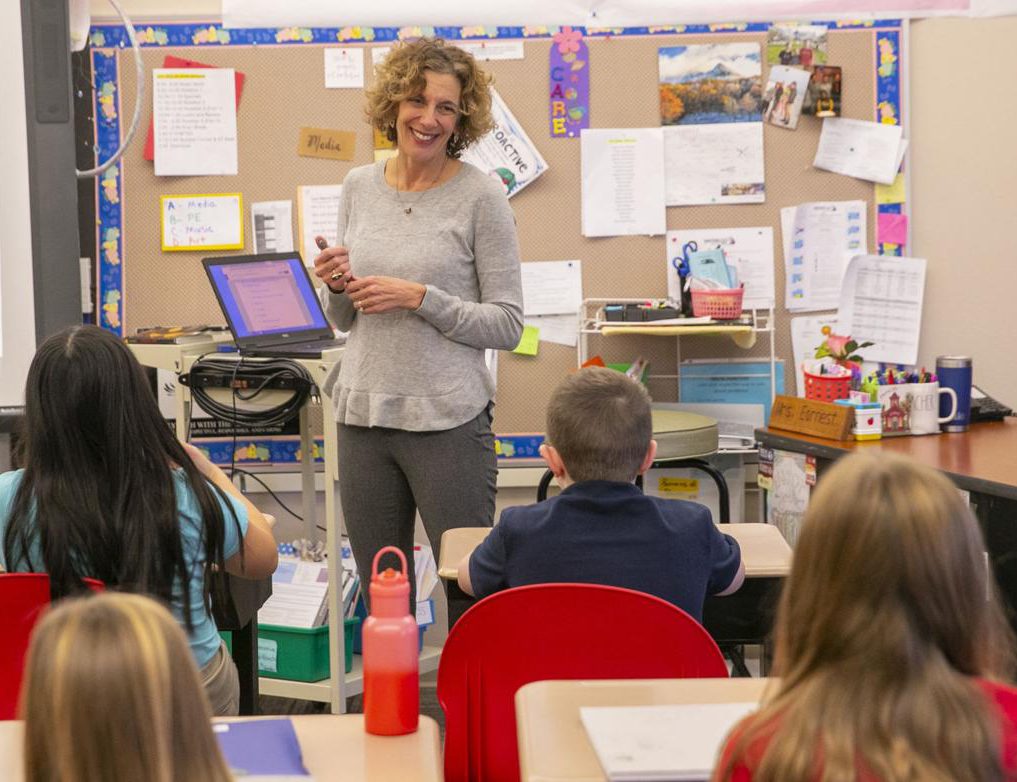Tagged: “break free from the past”
Finding Hope in the Midst of Trauma
Editor’s Note: This blog post was written by Dr. Suzanne Freedman, Educational Psychology Professor at the University of Northern Iowa, and is reposted with the permission of both the author and of Darlene J. Harris, creator of the website “And He Restoreth My Soul Project” where the blog originally appeared on May 1, 2022.
I automatically connect hope to my work on the topic of interpersonal forgiveness as an approach to healing from a deep, personal and unfair hurt. In this blog post, I will discuss why I believe choosing to forgive can offer individuals who have experienced the trauma of child abuse or sexual assault hope of healing and the power to move beyond their abuse.

“Forgiveness offers a way to heal, and have hope for the future, while acknowledging what happened was wrong, unfair, and extremely hurtful,” according to Dr. Suzanne Freedman, shown here during a research project with 5th grade students.
It is normal and natural to feel angry, and hopeless as a result of childhood or sexual assault trauma and one has a right to these feelings for experiencing something no individual should have to go through. If one believes that healing is impossible and/or there is nothing that can change their current attitude, feelings, and thoughts toward their abuser, it is likely they will feel despair and quite hopeless. Forgiveness offers an option for healing that allows one to hope and have faith in a better future, while also acknowledging that the abuse they experienced was unfair, deeply hurtful and unacceptable.
“I am often asked ‘Why forgive?’ and my response is always the same, ‘What’s the alternative?’
Although forgiveness cannot undo the injury or damage caused by the injury, it allows us to move forward in our lives without the negative effects of all-consuming anger, hatred, and resentment.
It offers a way to heal and have hope for the future.”
Dr. Suzanne Freedman
Hope is believing that things will get better even if they don’t feel that way now. Hope is making the decision to forgive and committing to the process, even if one does not feel the forgiveness in their heart yet. Knowing that one is strong enough to move forward in their own healing, at their own pace increases feelings of hope for the future and leads to greater emotional and physical well-being.
Hope isn’t just nice to have, at times it is essential for survival in unbearable situations. Without hope, the will to live can diminish. One may stop caring about themselves and others, and their beliefs toward achieving a good life decrease. Hope, although scary, is directly related to a person’s belief that they can cope and move beyond the abuse or trauma they have endured.
Read the rest of Dr. Freedman’s full blog at “Finding Hope in the Midst of Trauma.”
Dr. Suzanne Freedman is a Professor in the Educational Psychology Department at the University of Northern Iowa in Cedar Falls, Iowa. Her dissertation on forgiveness with incest survivors at the University of Wisconsin-Madison was a landmark study that was published in the Journal of Consulting and Clinical Psychology. She will be a speaker at the July 19-20, 2022, International Educational Conference on Agape Love and Forgiveness in Madison, WI.
Darlene J. Harris is a sought-after speaker, author of And He Restoreth My Soul (an anthology and resource guide on sexual violence), and the developer/leader of workshops and retreats for women. She writes primarily on the topics of sexual abuse and molestation because by the age of 18 she had been raped twice. “I don’t want anyone to hurt like I did,” is the mantra that drives her. Read her true-life story in her own words.
Checking in Again on Your Unfolding Love Story
For over 10 years on this site, we have posted a reflection in which we encourage readers to grow in love as their legacy of the present year. We have said this across the years:
“Give love away as your legacy of 2022.
How can you start? I recommend starting by looking backward at one incident of 2021. Please think of one incident with one person in which you were loved unconditionally, perhaps even surprised by a partner or a parent or a caring colleague. Think of your reaction when you felt love coming from the other and you felt love in your heart and the other saw it in your eyes. What was said? How were you affirmed for who you are, not necessarily for something you did? What was the other’s heart like, and yours?”
It is now about four months later. Can you list some specific, concrete ways in which you have chosen love over indifference? Love over annoyance? If so, what are those specifics and how are they loving? We ask because we have only about eight months left to 2022. Have you engaged in about a third of all the loving responses that you will leave in this world this year?
If you have not yet deliberately left love (or enough love) in the world this year, there is time. . . . . and the clock is ticking.
Robert
What is your very best reason for telling the world that forgiveness is good?
As your question implies, you are aware that there is more than one reason why forgiveness is good. To meet your challenge, I would say that the major reason why forgiveness is good is because it is linked to love, particularly what we call service love or agape love. When you forgive you are exercising this kind of love toward someone who has not been loving to you as seen in the person’s unjust actions. Thus, forgiveness is good because it meets injustice with the heroic virtue of love. I call it heroic because it is so difficult to offer agape love in the face of others’ injustice.
Because forgiveness is so important, do you think it is obligatory that those, who learn to forgive and develop an enthusiasm for it, should now teach others about forgiveness?
Because forgiveness is a choice, I do not think that we should put pressure on those who forgive to now go and become teachers of others. I do think that it is reasonable to let those who forgive know that helping others to now forgive is good, if this resonates with the person. In my own experience, I see people, who develop a pattern of being persistent forgivers, often do have an internal self-chosen obligation to teach and help others.
Benefits of Classroom Forgiveness Education Confirmed by New Groundbreaking Study
.
Published this month in Child Development1 (Volume 93, Issue 2, March/April 2022), the critique analyzed 20 randomized intervention studies of forgiveness education programs that were  implemented during school years 1996 through 2021. These studies spanned demographically diverse geographic areas including North America, Europe, Asia, and the Middle East.
implemented during school years 1996 through 2021. These studies spanned demographically diverse geographic areas including North America, Europe, Asia, and the Middle East.
The research, “A meta‐analysis of forgiveness education interventions’ effects on forgiveness and anger in children and adolescents,” was conducted by University of Wisconsin-Madison researchers Hannah Rapp and Jiahe Wang Xu (both graduate students in the Dept. of Educational Psychology), and Dr. Robert Enright, educational psychology professor and co-founder of the International Forgiveness Institute (IFI).
Other significant observations and findings in the just-published report include:
- Children and adolescents inexplicably experience hurt and conflict in their interpersonal relationships and can “benefit from learning more about what forgiveness is and the process of how to forgive.”
- Forgiveness education interventions “are effective regardless of whether participants have experienced severe or mild offenses or attend schools in economically disadvantaged areas.”
- Programs of both short and long durations “can lead to significant positive change in anger and forgiveness outcomes.”
- Children who forgive are more accepted by their peers.
- Positive results for students “echoed findings from previous reviews of forgiveness interventions with primarily adult populations.”
- Forgiveness education interventions are “significantly effective” whether they are facilitated by schoolteachers or by researchers.
- The forgiveness education curriculum and process developed by Dr. Enright2 and the IFI “yielded significant effects.”
Overall, the analysis presents strong evidence that “children and adolescents can benefit from forgiveness education interventions.” Read the full meta-analysis report.
_______________________________________________________________________________________________________
1 Child Development is a 92-year-old bimonthly scientific journal published by the Society for Research in Child Development (SRCD). It is a vital source of information not only for researchers and theoreticians, but for a broad range of psychiatrists and psychologists, educators, and social workers in more than 60 countries around the world.
2 The Forgiveness Education curricula developed by Dr. Enright and the IFI for pre-k through 12th grade students is based on children’s story books. Those stories teach about forgiveness and other moral virtues and equip children with the knowledge of how to forgive a specific person who offends if they choose to do so. Lessons begin by educating participants about the five concepts that underlay forgiveness: inherent worth, kindness, respect, generosity, and agape love. During the program, participants read and discuss several age and culture-appropriate stories that display forgiveness between characters such as in The Tale of Despereaux by Kate DiCamillo and in Horton Hears a Who! by Dr. Seuss.



